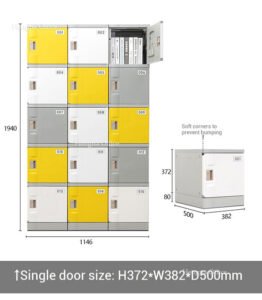Why Do Universities Prefer ABS Plastic Lockers Over Metal Ones?
The Shift in University Storage Solutions
Universities constantly evaluate their facility investments. Storage solutions represent a significant portion of these considerations. ABS plastic lockers have gained popularity in educational institutions. Many universities now prefer ABS plastic lockers over metal ones. This shift reflects careful analysis of long-term benefits. The decision impacts student experience and operational efficiency.
Durability in High-Traffic Environments
University facilities experience constant use. Students access lockers multiple times daily. ABS plastic lockers withstand this heavy usage effectively. They resist dents, scratches, and impacts common in busy campus settings. Metal lockers often show wear quickly. They develop dents and scratches that diminish appearance. ABS plastic maintains its integrity longer. This durability reduces replacement frequency. Universities appreciate this long-term value proposition.
Moisture Resistance and Maintenance Benefits
Campus environments expose lockers to various conditions. Humidity, rain, and cleaning chemicals challenge storage solutions. ABS plastic lockers excel in these situations. They resist moisture damage completely. Metal lockers face rust and corrosion issues. These problems require regular maintenance and repainting. ABS plastic lockers need minimal upkeep. Simple cleaning suffices to maintain their appearance. Maintenance teams save significant time and resources. This efficiency appeals to budget-conscious university administrators.

Enhanced Safety Features
Student safety remains a top priority for universities. ABS plastic lockers offer several safety advantages. They feature smooth edges without sharp corners. This design reduces injury risks during busy periods. Metal lockers may develop sharp edges when damaged. ABS plastic also resists bacterial growth. This property promotes healthier campus environments. Additionally, ABS plastic lockers don’t conduct electricity. They eliminate electrical hazards in certain situations. These safety benefits align with university risk management goals.
Customization and Aesthetic Flexibility
Universities value branding and cohesive campus design. ABS plastic lockers offer extensive customization options. They come in various colors to match school colors. Institutions can add logos and mascots easily. Metal lockers offer limited customization possibilities. They typically require special processes for color changes. ABS plastic lockers maintain their color vibrancy longer. They don’t fade or chip like painted metal surfaces. This aesthetic flexibility supports university identity initiatives.
Cost-Effectiveness Over Time
Initial purchase price represents only one consideration. Universities evaluate total cost of ownership. ABS plastic lockers demonstrate superior long-term value. They require fewer replacements due to durability. Maintenance costs remain consistently low. Energy efficiency during manufacturing also appeals to sustainability-focused institutions. Metal lockers may seem economical initially. However, their lifetime costs often exceed ABS plastic alternatives. Universities recognize this financial advantage. They prioritize solutions that deliver sustained value.
Noise Reduction in Campus Settings
Campus hallways and locker areas can become noisy. Metal lockers contribute significantly to this noise. They create loud slamming sounds during busy periods. ABS plastic lockers operate much more quietly. They absorb sound rather than amplifying it. This noise reduction improves the campus environment. Students and faculty appreciate quieter hallways. This acoustic benefit enhances the overall educational experience. Universities consider this factor when evaluating storage solutions.
Environmental Considerations
Sustainability initiatives influence university purchasing decisions. ABS plastic lockers offer several environmental advantages. They often contain recycled materials. At end-of-life, they can be recycled again. Manufacturing processes typically consume less energy than metal production. These attributes align with university sustainability goals. Metal lockers require more energy-intensive production. Their recycling process also demands significant resources. Environmentally conscious institutions prefer ABS plastic alternatives.
Comparison Chart: ABS Plastic vs. Metal Lockers
| Feature | ABS Plastic Lockers | Metal Lockers |
|---|---|---|
| Durability | High impact resistance, dent-proof | Prone to dents and scratches |
| Moisture Resistance | Excellent, no rust or corrosion | Susceptible to rust and corrosion |
| Maintenance | Minimal, easy cleaning | Regular maintenance required |
| Safety | Smooth edges, non-conductive | Sharp edges when damaged, conductive |
| Customization | Wide color options, easy branding | Limited customization options |
| Noise Level | Quiet operation | Loud slamming sounds |
| Environmental Impact | Lower energy production, recyclable | Higher energy production, recyclable |
| Long-term Cost | Lower total cost of ownership | Higher maintenance and replacement costs |
Conclusion: A Clear Preference for Modern Universities
Universities prefer ABS plastic lockers for compelling reasons. These storage solutions address multiple institutional priorities. They offer superior durability and require minimal maintenance. Safety features protect students and reduce liability risks. Customization options support campus branding initiatives. Long-term cost-effectiveness aligns with budget constraints. Noise reduction improves the educational environment. Environmental attributes support sustainability goals. Metal lockers simply cannot match this comprehensive value proposition. As universities continue optimizing their facilities, ABS plastic lockers represent the clear choice for modern educational institutions.

